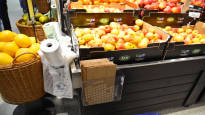Single-use plastic restrictions are already in force in more than a hundred countries. The amount of plastic waste in the world has doubled in the 21st century.
New Zealand is taking the plastic problem seriously.
Like many other countries, the island nation had already banned the sale of thicker plastic bags in 2019. Now the ban extends to thin plastic bags, which are typically used to pack fruits and vegetables.
The country is the first to ban thin plastic bags in shops, tells including the BBC.
New Zealand’s Minister for the Environment by Rachel Brooking according to the 2019 plastic bag ban would have already saved a billion plastic bags. The new law is supposed to reduce the use of fruit bags by 150 million per year.
However, the use of paper bags is feared to increase as a result of the plastic bag ban.
– This is still worth it, Environment Minister Brooking assured the media.
According to him, the purpose is to reduce all disposable materials.
– So we want people to bring their own bags to the store, and supermarkets sell reusable bags, Brooking said.
The plastic bans are part of New Zealand’s broader climate program.
The country’s government declared a climate emergency in 2020. However, according to critics, the law has remained merely symbolic, as the country’s emissions have not decreased in recent years despite the state of emergency.
Plastic bag bans in over a hundred countries
The amount of plastic waste has grown exponentially worldwide.
The amount of waste has almost doubled since the beginning of the millennium. In 2021, it was produced in total almost 400 million tons.
Single-use plastic products especially pollute water bodies, such as oceans and rivers.
The nations of the world have begun to wake up to the problem. More than a hundred countries have some kind of single-use plastic restrictions in force, tells Euronews news site.
According to Euronews, the bans have produced results. Both the use of plastic bags and littering have decreased in countries or states that have imposed bans.
Plastic taxes have also been effective. In Ireland, for example, the use of plastic bags fell by 90 percent after they were taxed in 2001.
The European Union has banned the use of many single-use plastics, such as straws and plates. In some member countries, the use of thin plastic bags is also restricted.
Source: AP
